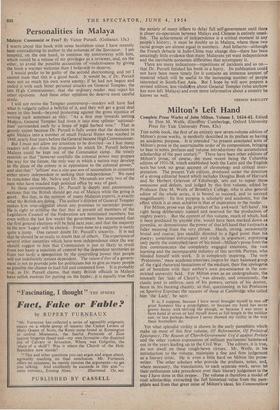Personalities in Malaya
Malaya: Communist or Free? By Victor Purcell. (Gollancz. 15s.)
I WRITE about this book with some hesitation since I have recently been contradicting its author in the columns of the Spectator. I am tempted, on the one hand, to continue my controversy with him, which would be a misuse of my privileges as a reviewer, and, on the other, to avoid the possible accusation of vindictiveness by giving the book a warmer welcome than I believe it to deserve.
I would prefer to be guilty of the second shortcoming, and yet I cannot state that this is a good book. It would be, if Dr. Purcell were not so much his own worst enemy; if he had not begun and ended it with such bitter personal attacks on General Templer, the late High Commissioner, that the ordinary reader may reject his other opinions. And these other opinions do deserve most careful study. I will not revive the Templer controversy—readers will have had what is vulgarly called a bellyful of it, and they will get a great deal more in this book—beyond protesting against the gross injustice of writing such sentences as this: "As a first step towards uniting Malaya, General Templer had riven it into nine splinter 'national- ities' surrounded each by a fence of legal barbed wire." ' That is grossly unjust because Dr. Purcell is fully aware that the decision to split Malaya into a numbir of small Federal States was reached in 1948, nearly four years before the General became High Commissioner.
But I must not allow my attention to be diverted—as I fear many readers will do—from the proposals by which Dr. Purcell believes Malaya could be kept out of the Communist camp. He wisely reminds us that "however carefully the colonial power may prepare the way for the future, the only way in which a nation may develop in the place of the colony is in opposition to the colonial power," and also that " 'leftism' was a sine qua non of nationalism in countries either newly independent or seeking their independence." We need to remember that Mr. Nehru and Dr. Nkrumah are only two of the men who have reached high political office by way of gaol.
In these circumstances, Dr. Purcell is deeply and passionately anxious that the British should get out of Malaya while the going is good. But that, in the opinion of many Malayan experts, is exactly what the British are doing. The author's distrust of General Templer makes h:m over-sdptical about any promises to surrender power. He is right to criticise the fact that at present all members of the Legislative Council of the Federation are nominated members, but even within the last few weeks the government has announced that the first general elections will be held next year, and that the majority in the new 'Legco' will be elected. From none to a majority is surely quite a jump. One cannot doubt Dr. Purcell's sincerity. It is sad that he should be so ready to doubt that of others. The experience of several other countries which have won independence since the war should suggest to him that Communism is just as likely to result from too hasty a rejection of control by the dependent territories as from too tardy a reoognition by the controlling power that people will not indefinitely remain dependent. The raison d'être of a govern- ment is not to provide jobs for politicians but to give as many people as possible the chance to lead full and contented lives. It is probably true, as Dr. Purcell claims, that many British officials in Malaya have selfish motives for putting on the brake; it is equally true that
the anxiety of many others to delay full self-government until there is closer co-operation between Malays and Chinese is entirely unsel- fish. The achievement of independence is a critical moment in any people's history; it must be doubly so in Malaya, where these two racial groups are almost equal in numbers. And hitherto—although the French debacle in Indo-China may change this—there has been amazingly little evidence that many Malayans yet want independence and the inevitable economic difficulties that accompany it.
There are many indications—repetitions of incidents and so on— that Dr. Purcell finished his book in a hurry. Its publication could not have been more timely for it contains an immense amount of material which will be useful to the increasing number of people interested in South-East Asia. But I hope he will now prepare a revised edition, less vindictive about General Templer (who anyhow has now left Malaya) and even more informative about a country he knows so well.
VERNON BARTLETT


































 Previous page
Previous page